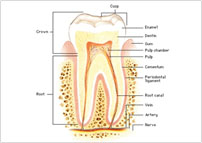Root Canal Therapy
 Root canal therapy may need to be performed when the nerve of a tooth becomes irreversibly affected by decay or infection. A tooth can become abscessed as a result of deep decay, cracks, or trauma to the tooth. This is usually caused by the infiltration of bacteria into the
Root canal therapy may need to be performed when the nerve of a tooth becomes irreversibly affected by decay or infection. A tooth can become abscessed as a result of deep decay, cracks, or trauma to the tooth. This is usually caused by the infiltration of bacteria into the
center-most part of the tooth called the pulp. Root canal therapy is the only procedure that can save the tooth.
In order to save the tooth, the pulp, bacteria, and any decay are removed and the resulting space is filled with special medicated dental materials. A tooth that has undergone root canal therapy is brittle and must be crowned within a couple of weeks to give the tooth sufficient strength. A crowned tooth is cared for in the same way as other natural teeth by brushing and flossing daily and through regular visits to the dentist.
Having a root canal is the treatment of choice to save a tooth that otherwise would die and have to be extracted. Many patients believe that removing a tooth that has problems is the solution, but what is not realized is that extracting a tooth will ultimately be more costly and cause significant problems for adjacent teeth.
The number of visits necessary to complete a root canal vary depending upon the degree of infection, the number of canals, and the complexity of the procedure. Due to technological advancements, root canals can be performed faster, more accurately, and with less discomfort than in previous years. Root canal therapy is highly successful and usually lasts a lifetime, although on occasion, a tooth will have to be retreated due to new infections. If the root infection is too severe for a root canal to be performed, then the only other alternative is tooth extraction.
Signs and symptoms for possible root canal therapy:
- An abscess on the gums
- Sensitivity to hot and cold
- Severe toothache pain
- Sometimes no symptoms are present
- Swelling and or tenderness
How root canal therapy works
A root canal procedure requires one or more appointments and can be performed by a dentist or endodontist, a root canal specialist. While the tooth is numb, a rubber dam will be placed around it keeping it dry. An access opening is made on top of the tooth and a series of files remove the pulp, nerve tissue, and bacteria. Once the tooth is thoroughly cleaned, it will be sealed with special dental materials. A filling will be placed to cover the opening on top of the tooth. If additional appointments are needed, a temporary filling will be placed until the treatment can be completed. After treatment, your tooth may still be sensitive, but this will subside as the inflammation diminishes and the tooth heals.
All teeth that have root canal therapy should have a crown placed to protect the tooth and prevent it from breaking, restoring it to its full function. You will be given care instructions after each appointment. Good oral hygiene practices and regular dental visits.